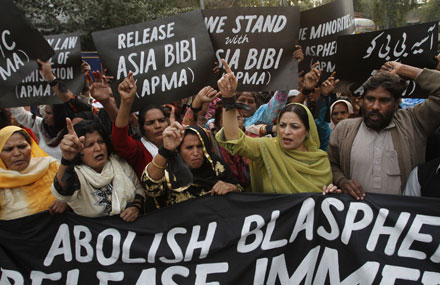http://ahmadiyyatimes.blogspot.com/Four years ago, Asia Bibi was asked to fetch water while working in the fields. Some of her Muslim fellow workers refused to drink it because they considered it to be “unclean” since it was collected by a Christian. A dispute ensued and her co-workers complained that she blasphemed against the Prophet Muhammad. Then she was arrested, sentenced to death by hanging, and has been languishing in a jail ever since. Her husband and five children live under death threats and have been forced into hiding. The case has prompted widespread international condemnation, including from heads of state and the Pope. Pakistan has the strictest anti-blasphemy laws. Several sections of Pakistan’s Criminal Code forbid damaging or defiling a place of worship, outraging religious feelings, defiling the Quran or defaming the prophet Muhammad. The wording of the laws is vague and can be subject to abuse, either by the authorities or by any Pakistani who can accuse a fellow citizen of blasphemy with a personal complaint to the prosecutor. Punishment can be life imprisonment of or even death. Those accused of blasphemy are frequently threatened or attacked, even before any investigation has been carried out. People take to the streets and violence waged by pro-blasphemy groups ensues. Asia Bibi’s case is such a political hot potato in Pakistan that it appears to have paralyzed the authorities. In Pakistan, some of those who publicly called for Asia’s release were murdered. For example, the Governor of Punjab, Salmaan Taseer, was assassinated by his very own bodyguard because he defended Asia Bibi and vocally opposed Pakistan’s blasphemy law. Pakistan’s Minority Affairs Minister Shahbaz Bhatti, the only Christian member of Pakistan’s cabinet, was also assassinated for speaking out. Each time that a Christian villager is accused of blasphemy, heaps of Christian neighbors flee the area out of fear that they are next in line to be harassed or accused of the same “crime.” While Asia Bibi’s case has been widely featured in media reports around the world, scores of victims accused of blasphemy vanish into the shadows without the public hearing of them. Despite the international and domestic commotion, Asia Bibi is still in jail. How can that be? Why hasn’t the Pakistani government released her? In 2010, President Asif Ali Zardari dropped plans to issue a presidential pardon after hardline pro-blasphemy groups staged massive demonstrations against the measure. Hitting a sensitive nerve, the case has shed light on how the Pakistani government has been taken hostage by militant extremists. Pakistani judges are under pressure from mobs waiting outside their courtrooms, ready to spark riots. Lawyers fear assuming the defense of the accused. And rather than doing what’s right, it’s easier for the Pakistani authorities to turn a blind eye. Releasing Asia Bibi and amending article 295 of the Pakistani penal code, its inflammatory anti-blasphemy law that places Pakistani society at the mercy of religious extremists, would help Pakistan demonstrate that it will not bow down to those who threaten the rule of law through violence and intimidation.
M WAQAR..... "A man's ethical behavior should be based effectually on sympathy, education, and social ties; no religious basis is necessary.Man would indeed be in a poor way if he had to be restrained by fear of punishment and hope of reward after death." --Albert Einstein !!! NEWS,ARTICLES,EDITORIALS,MUSIC... Ze chi pe mayeen yum da agha pukhtunistan de.....(Liberal,Progressive,Secular World.)''Secularism is not against religion; it is the message of humanity.'' تل ده وی پثتونستآن
Friday, August 30, 2013
Blasphemy in Pakistan: Why is Asia Bibi still in jail?
Subscribe to:
Post Comments (Atom)


No comments:
Post a Comment